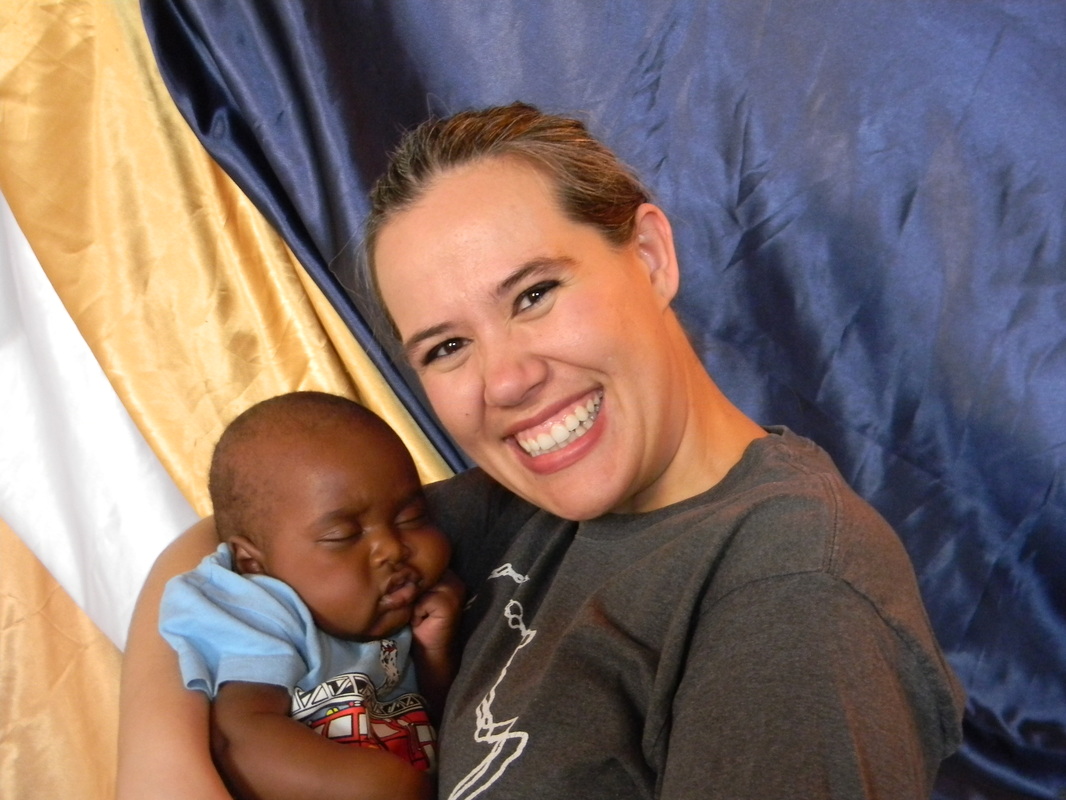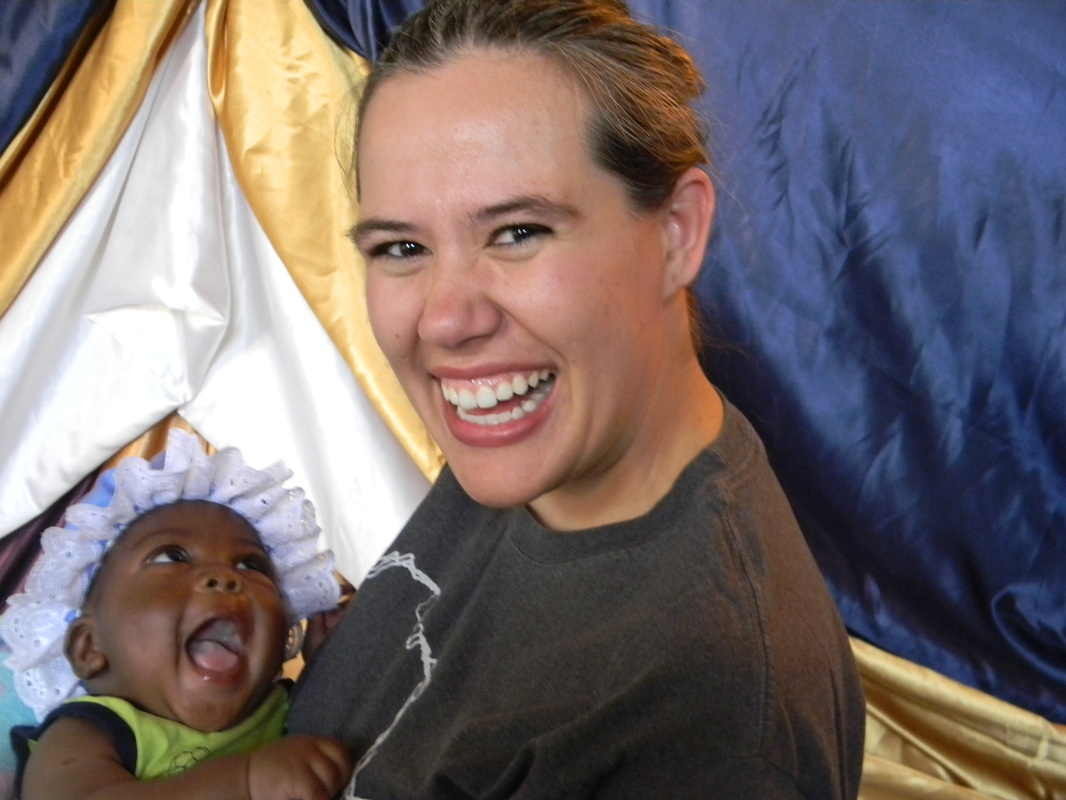 This is our Shona teacher
This is our Shona teacher The church had recently moved to a new location. It is a fairly new church plant, with a younger pastor (something that is rare here because it is often assumed that only older pastors are qualified to preach. This stems from the deep conviction in the Zimbabwean culture that with age comes wisdom). This church was predominantly made up of women, children, and younger men. Most of the congregants were from a very low economic level and some were even unemployed, due to the high unemployment rate in Zimbabwe (about 86%).
 The pastor and his wife
The pastor and his wife My Shona teacher mentioned how the church was not only a new church, but a poor church and as such had still not purchased any chairs yet. I insisted that that would not be a problem and that I did not need a chair. However, she continued to explain how the Shona culture feels the need to overtly express their gratitude to special guests (i.e. speakers). I knew this to be true and of course when we arrived to our location everyone had put their few dollars together to hire chairs for the day, a small podium draped with cloth, and a beautiful satin cloth drapery on the wall behind the podium. They even went the extra mile to bring someone’s sofa from home so that I would have a soft chair to sit on. Clearly, they were excited.
My Shona teacher had introduced me at church the previous Sunday and when she explained that I was white everyone was very excited. Many of the women had never even spoken to a white person before, even though they live in town and have seen white people around. This also means however, that they have already built their own assumptions about what a white person might be like (of course we know that race does not determine character, personality or morality). This is also partly because of the political environment in which they have been brought up in and the propaganda that surrounds the issue of race and diversity, or the lack thereof, within Zimbabwe. This is because of the fact that the white population is 0.01% of the population.
I had promised to bring tea, sugar, milk, and cookies for teatime if the ladies provided firewood and a large pot (due to no electricity). Of course we brought our own well water too (since this would be in the city and the water isn’t good for drinking). After the talk the ladies quickly made a fire, and started serving cups of sweet, milky tea and downed the 2.5 pounds of cookies. But let me rewind just a little…
I had been told that I could pick my own topic when I was asked to speak. I spent a lot of time in prayer and consideration before making my final decision. I decided to speak on the issue of a “Woman’s Worth” of course this was highlighted through the lens of the African context. I wasn’t sure if I should address something that seems almost counter-cultural in a society that places not only very little worth on women, but very little worth on the individual. However, I knew without a doubt that this topic was essential in knowing their individual worth IN Christ Jesus and the whole talk was focused around that key point. I began with introducing myself and explaining a little about my background – even though they are Zimbabwean it was hard for them to believe that I was truly African, merely by the color of my skin – this is something I have to deal with even in the US, so the explanations began with how long my family has been in Africa (over 400yrs).
I wanted to interact with these women and find out what they believed a woman gets her worth and where they believed they find it. Initially this interaction was slow because they are use to being told what is true, right, and necessary rather than being asked their input and opinions. I knew that they would hesitate to respond at first but after a few minutes a few brave souls made their opinions known and others followed. And of course just as I had assumed, they believed their worth was by what they could provide, what they could do, their role as a wife, the ability to have children and even their role in church – to name a few.
As I progressed in my talk it became quickly apparent to them that their worth ultimately came from Christ, and Christ alone. And then I went on to explain what that worth entails – being valuable, being loved, being precious, being important, being unique, etc, etc, etc (beauty was a passing word of description because unlike western mindsets women do not feel the need to find their worth in the way that they look, in fact a fuller figure woman is considered more beautiful because it implies health and wealth. Needless to say I have been complimented with the “You are so very thick,” or “You are so fat,” more than once and my western trained mind cringes at the innocent flattery of these African woman J
I briefly shared the Gospel towards the end of my presentation to make sure that the women understood what it meant to be IN Christ Jesus. This particular talk did not lend itself to an invitation to accept Jesus per sé, but it opened the door for me to return after having gained their respect so that I can extend the invitation next time.
My Shona teacher who translated through the talk said she struggled to translate at one point because she was so emotional. She said at first she wondered where I was going with it but then admitted that she had never heard anything like it before. She said as an African woman you never hear anything about your worth or value or importance in society. She said even in church you do not hear such a thing, you hear about what you must do and must not do, not about who you are at the core of your being.
I was sure throughout the talk to ask a few of the much older women what their thoughts were (respect for the elderly is very important in the Shona society – inviting them to share their personal thoughts and opinions not only shows respect to the culture but also builds rapport among the community). Towards the end, the oldest lady in the group who had not said a word up to this point, stood up, pointed at me and said, “You are African!” All the women stared and then all nodded in unison and some verbally agreed by utilating (a similar sound is made when you place a finger to a baby’s bottom lip and move it quickly up and down and they let out a sound). My eyes welled-up at this point because if there were a barrier before with this group, then I had just pierced it; praise the Lord!
Of course African time means everyone shows up when they do and this is primarily because people are event oriented and not time oriented. So when I was giving my closing sentence a couple ladies walked in. I knew it would be disrespectful to close at that point so I had to wing-it and continue talking for another 20 mins. This then led us into a time of worship where we all stood and one lady led in song while we followed her lead. We sang, clapped, danced, and praised the Lord in a way that is so typically African and so very unabandoned.
Please pray for these women, pray for their concerns and struggles, pray for their needs and their strength to carry on when life seems too hard.
 These are all the ladies who attended
These are all the ladies who attended We pray you are having a blessed week!



 RSS Feed
RSS Feed